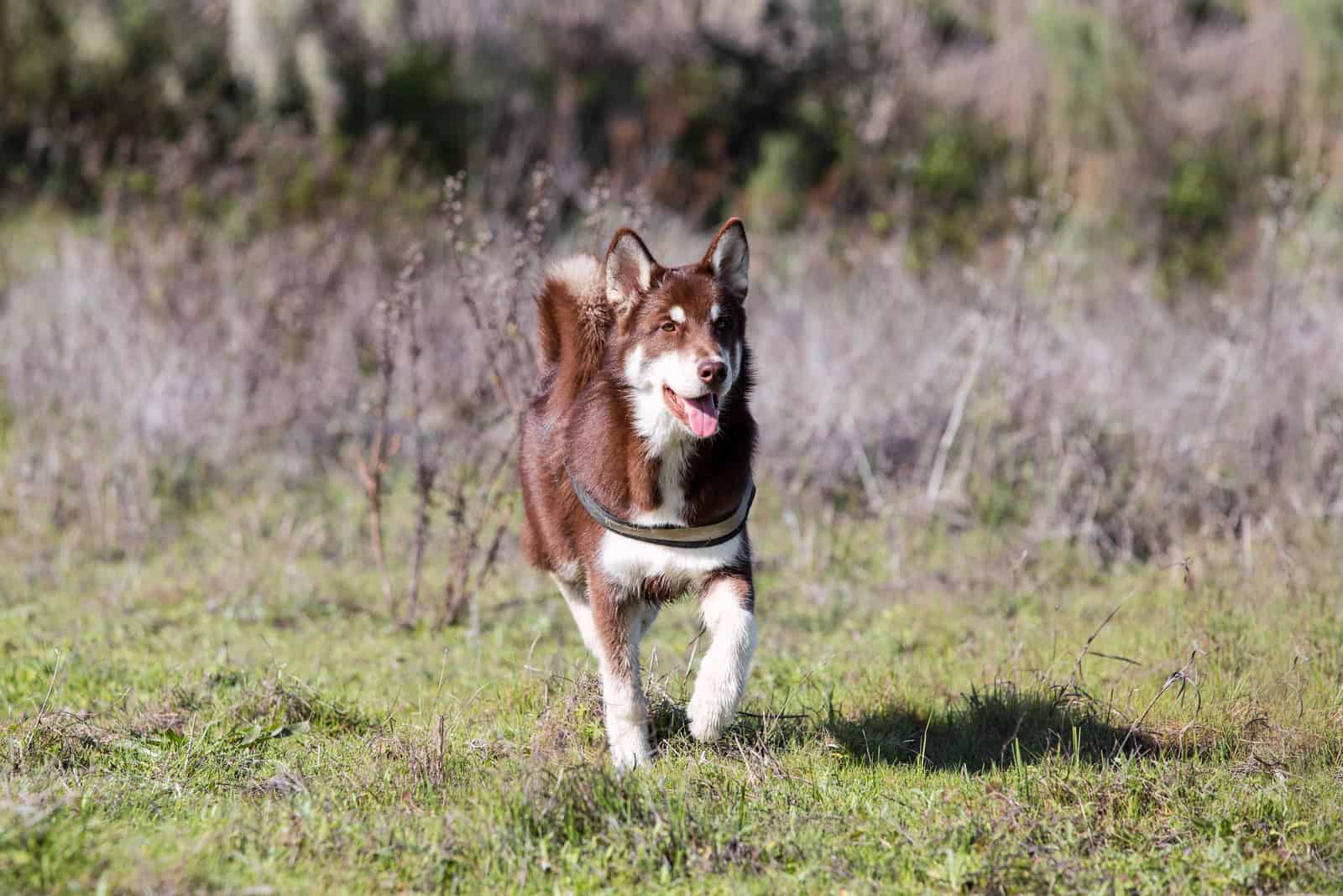Everyone knows what a Siberian Husky dog is! This is one of the dogs that are effortless to recognize.
With their wolf-like appearance, black and white or silver and white coat, and striking blue eyes, Siberian Huskies are dogs like no other.
In fact, according to many, Siberian Huskies are among the most beautiful dog breeds out there!
But, what if we told you about brown Huskies?
It’s true, Huskies can come in more different colors than just standard black and grey shades. In fact, these working dogs can be quite colorful! Brown Huskies are just one of the gorgeous combinations you might be able to find.
So, what are brown Huskies? Are these purebred dogs that just happen to have a different coat color, or are they mixed breeds with some other canines, such as German Shepherds or Labrador Retrievers?
Let’s find out!
Do Brown Huskies Exist?
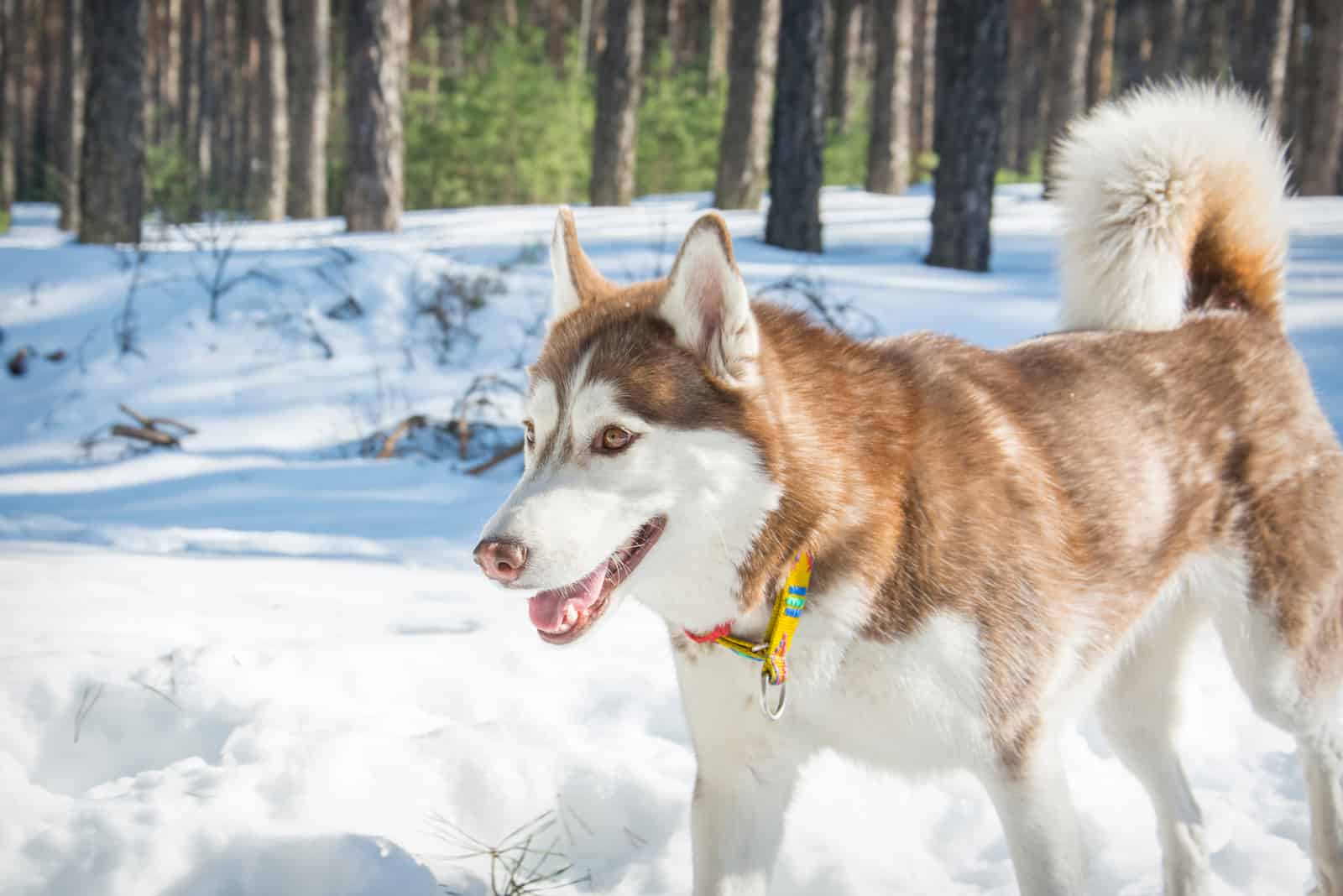
Yes, brown Siberian Huskies exist! Not just that, but they are deemed among the most beautiful Husky colors out there.
The coat shade of a brown Husky can vary from chocolate to copper, and it gives this dog a unique look that is like no other.
As these dogs don’t have standard Husky colors, many people think they are not purebred, or that they don’t belong to the Siberian Husky breed at all.
Despite this, I can confirm that brown Huskies are no less Siberian Huskies than their grey-colored counterparts.
AKC And Brown Huskies
The American Kennel Club (AKC) recognizes many Siberian Husky colors. One of them is brown. However, there is a catch.
Only brown and white and red and white Huskies have been officially recognized by the AKC. Any Husky, other than the black and the white Siberian Husky, has to have saddle markings. Solid colors, such as solid brown, are not recognized. Parti markings are possible, but they are not desirable.
This doesn’t necessarily mean that the dog isn’t purebred or that there is something wrong with him. He simply has an appearance that would be considered undesirable among the judges at the dog show.
On the other hand, The United Kennel Club (UKC) recognizes all Husky colors. Federation Cynologique Internationale (FCI) also recognizes red colors that could include brown shades, as well, and allows the dogs to be solid-colored.
Brown Husky Appearance
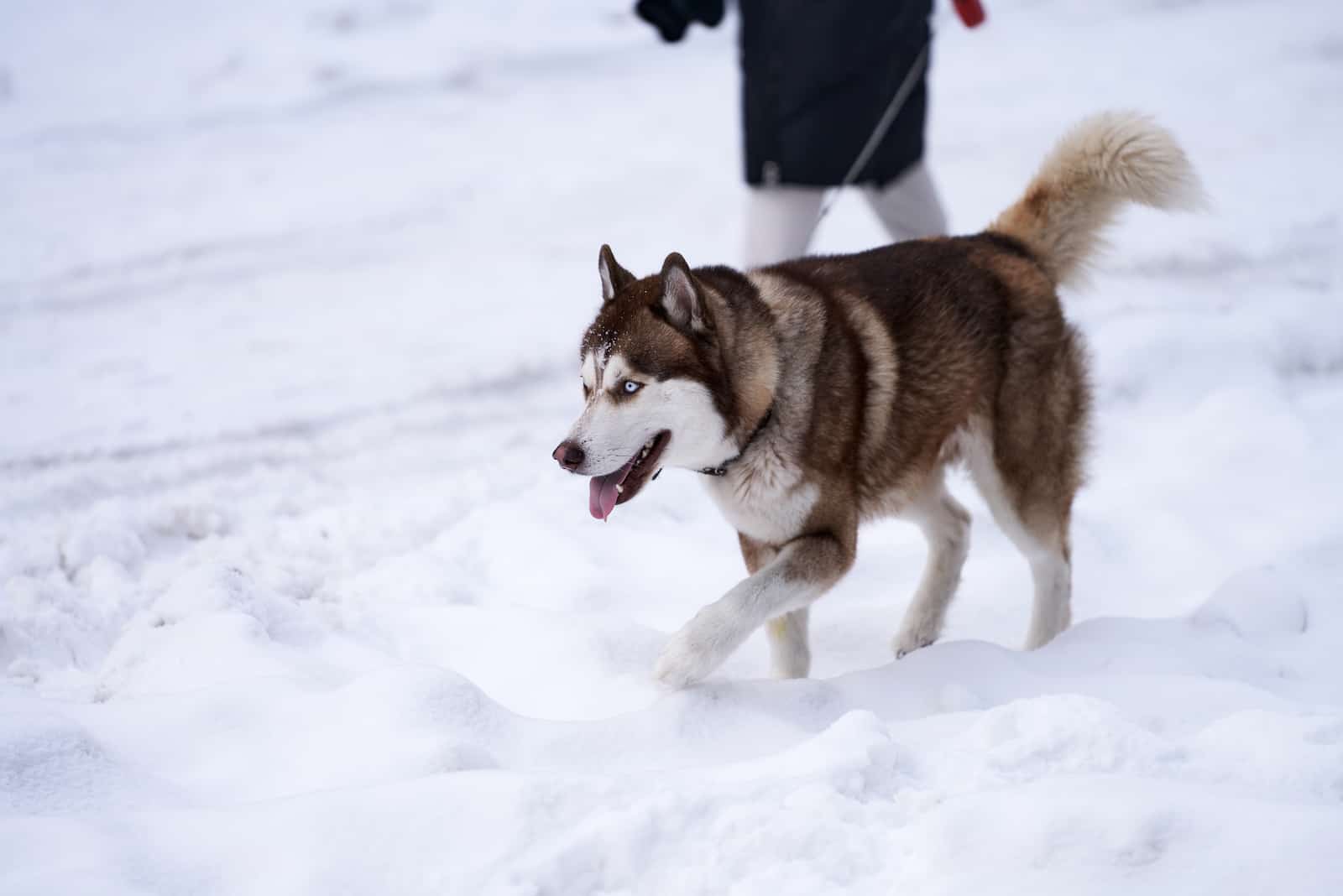
Other than their coat color, brown Huskies are not different from any other Huskies.
Male brown Huskies have a height of 21 – 23.5 inches, while females are a bit shorter, standing 20 inches to 22 inches in height. This makes them a medium-sized breed – although some would argue that these are large dogs.
They have a luscious and thick double coat, with a thick undercoat and a somewhat longer topcoat. Sable hairs are common – meaning that there are dark tips on the brown-colored hair.
Their faces are medium-sized, and their ears are triangular and erect – another reason why many people think Huskies are dogs that have been mixed with wolves.
These are proud dogs that will always stand straight and tall. Their fluffy tails usually curl upwards, but they won’t be entirely curled like in Akitas, but rather retain a shape of a sickle.
Their gait is smooth, allowing them to effortlessly start running around the moment something sparks their interest.
The coat color of a brown Husky can come in several shades, such as chocolate, mahogany, red, and copper. Most of these dogs will have sable hairs and white markings, but you might be able to find solid-colored dogs, as well.
Brown Husky With Blue Eyes
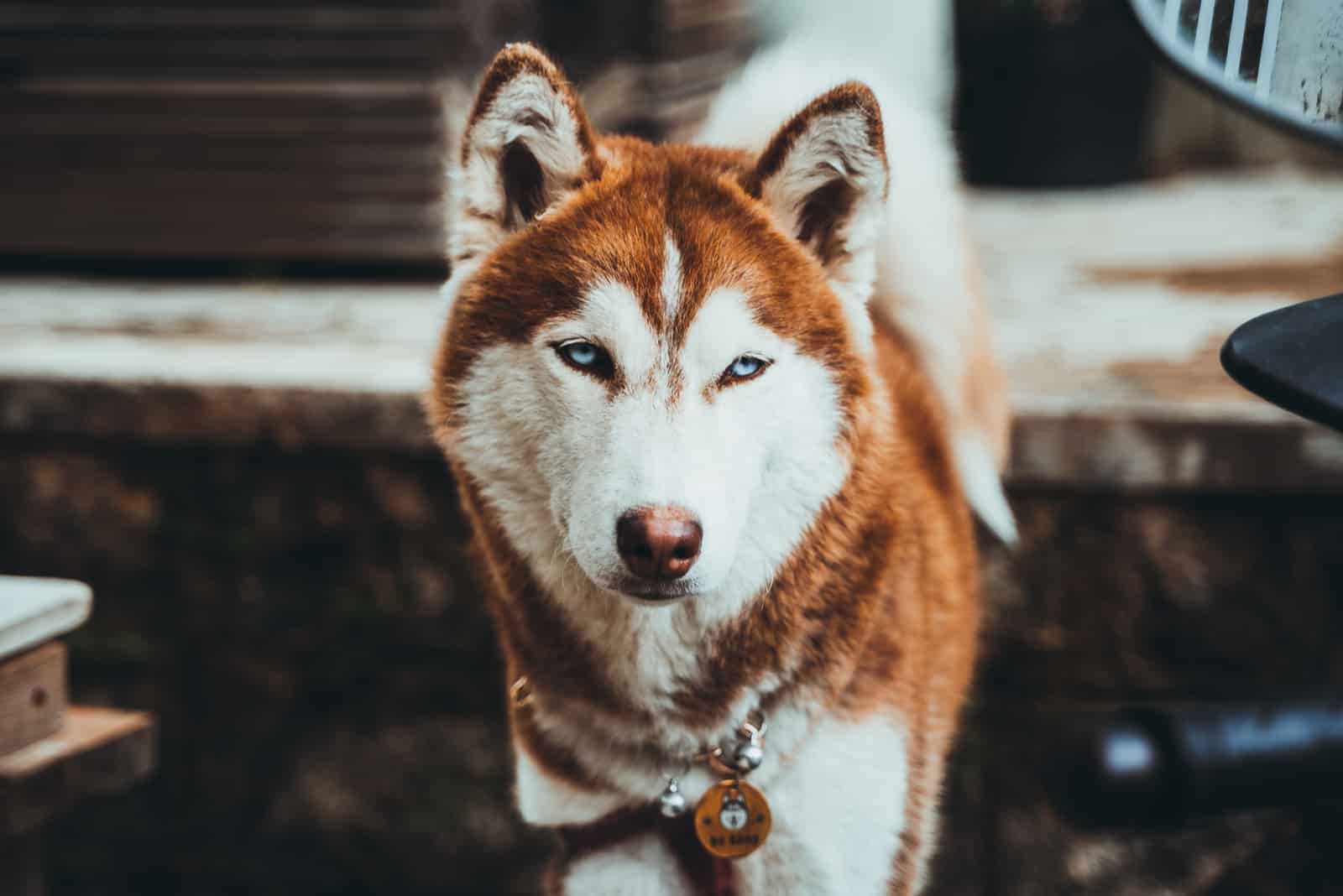
Huskies can have various eye colors. Brown eyes and blue eyes are equally common, as well as different-colored eyes (heterochromia) or even eyes that are spotted or partially colored!
When it comes to brown Huskies, the most common eye color you will find is brown. It can range from dark brown to hazel.
However, unlike in most other brown dogs, blue eyes are also very common in brown Huskies.
This is because, in most dog breeds, blue eyes are caused by the same dilution genes that change the coat color. This is why most dogs with a blue coat have blue or grey eyes, and dogs in liver color have hazel or green.
Brown Huskies are the result of the same dilution gene that can be found in other dogs. This is why there are no black hairs or black spots on their bodies. Even their nose color is brown!
However, Huskies’ eyes aren’t blue because of a dilution gene.
Huskies have blue eyes due to a specific mutation in the ALX4 gene. This causes decreased pigment production in the dog’s eye only.
As this mutation doesn’t have to cause even pigment loss, Huskies commonly have heterochromia.
In fact, if you compare the blue eyes of a Husky with blue eyes that might be found in many blue dogs, you’ll notice that Huskies’ eyes have a much brighter color. They look more like eyes you can find in merle dogs.
Still, the blue eye color in Huskies doesn’t indicate that the dog is merle. This is an independent mutation that doesn’t lead to vision problems. This is what makes brown Huskies’ eyes so unique.
Brown Husky Temperament
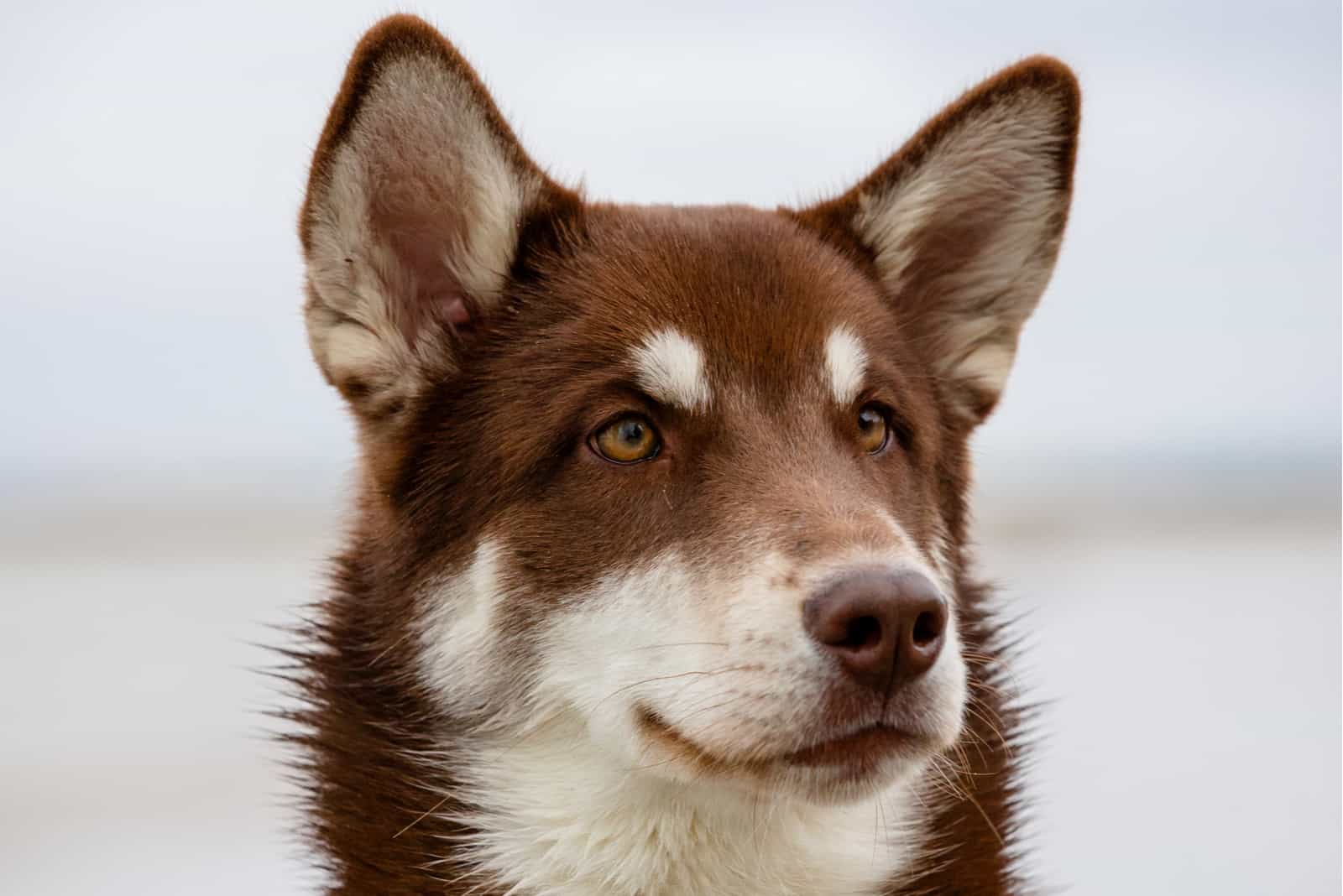
Huskies are among the friendliest and goofiest dogs you can get. They are known to be the clowns of the group, and you can be certain they’ll make you laugh all the time!
These are social dogs that do not want to be left alone. They are people-pleasers and love having a large family to play with.
As these are high-energy canines due to their history as sled dogs, they require lots of exercise and long walks. Also, make sure to give them enough mental stimulation. Brown Huskies are very intelligent and they might get bored easily. If this happens, they can become destructive.
Still, they’re as friendly as it gets. In fact, they can be so friendly that they make terrible guard dogs! Not only do they seldom bark, but they’ll try to befriend the intruder.
They are friendly not only toward humans but other pets and dogs alike. Just be careful – these pups have a high prey drive. Don’t leave them unattended with smaller dogs and animals unless you’ve socialized them from a young age to be around them. Otherwise, their instincts might win them over.
Huskies require proper dog training and an alpha dog in the pack. They love being in the group, but you’ll need to show them who’s the boss. If you don’t, they’ll assume this role belongs to them, and this won’t end up well.
Despite their love of humans, brown Huskies are very independent dogs. They have a free spirit, and they’ll do things they want to do, the way they want to do this.
Unfortunately, this also means they are likely to wander off chasing a squirrel or an interesting smell. Make sure you have them on a proper leash and collar and that your backyard is escape-proof. Spaying and neutering will help, as well.
Another thing to think about is that Huskies are not barkers, but rather howlers. Yes, your Husky will howl as a way of communication. This can result in rather unnerving noises that might make your neighbors upset.
Proper dog training is the key, as you’d have to teach your dog when to stop howling and to stay quiet. While even this isn’t a guarantee that your Husky will stay quiet, it’s still important to do your best.
Are Brown Huskies Good Family Dogs?
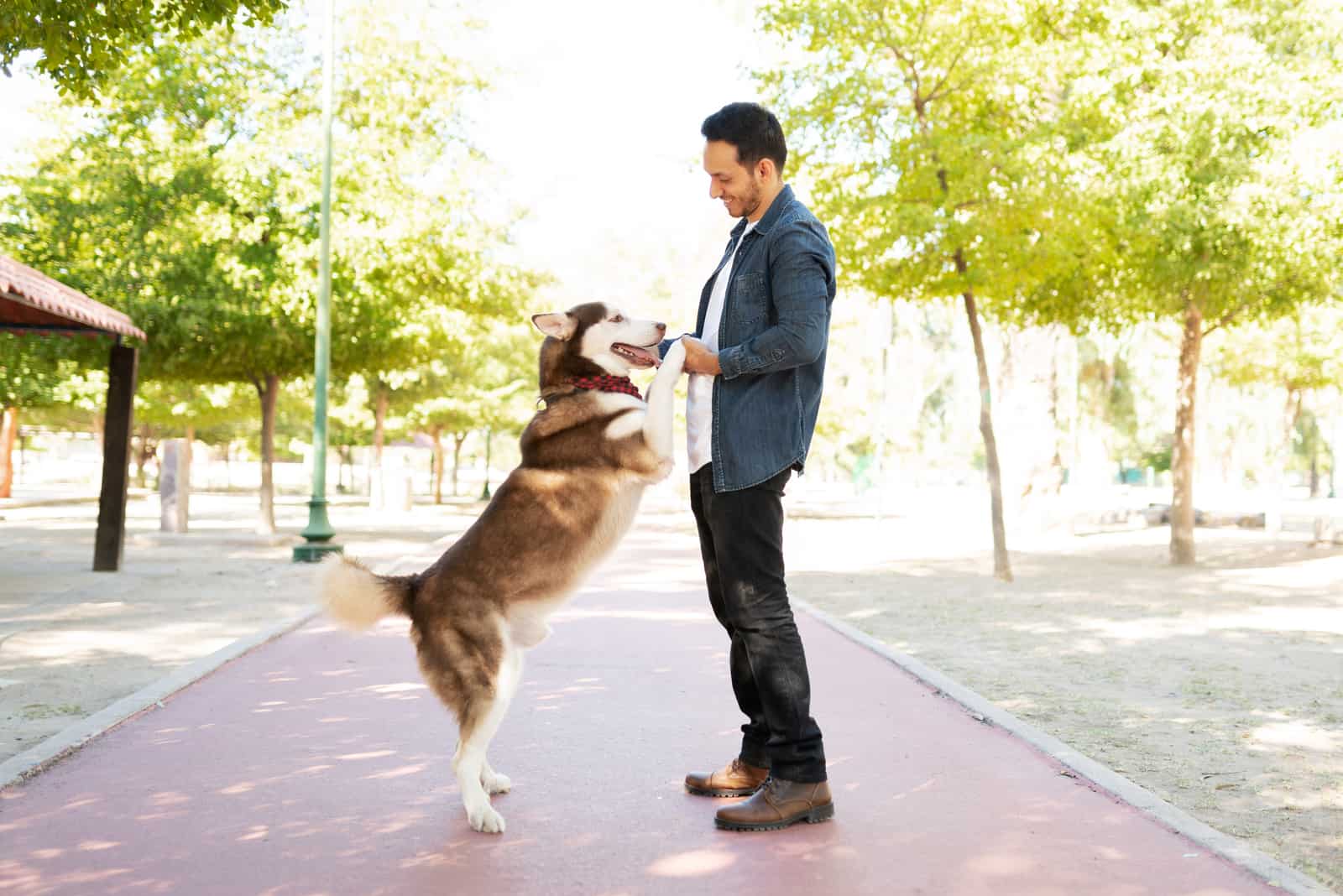
Brown Huskies have excellent temperaments, making them great family companions for everyone. These are friendly dogs that love being around humans all day long.
In fact, they love their family members so much they are prone to separation anxiety if left alone for too long. This is why they might not be a good choice for someone who spends a lot of time outside of their home.
Huskies even make great companions for children as they are playful and goofy. Kids are excellent playmates for them!
Just keep in mind that an adult Husky can weigh 60lbs, sometimes even more. They are large enough to knock a child over, and accidents might happen during rough play.
Not just that, but Huskies are known to shed. This might make them a bad choice for kids with asthma or dog allergies, as it can make their condition worse.
Brown Husky Grooming
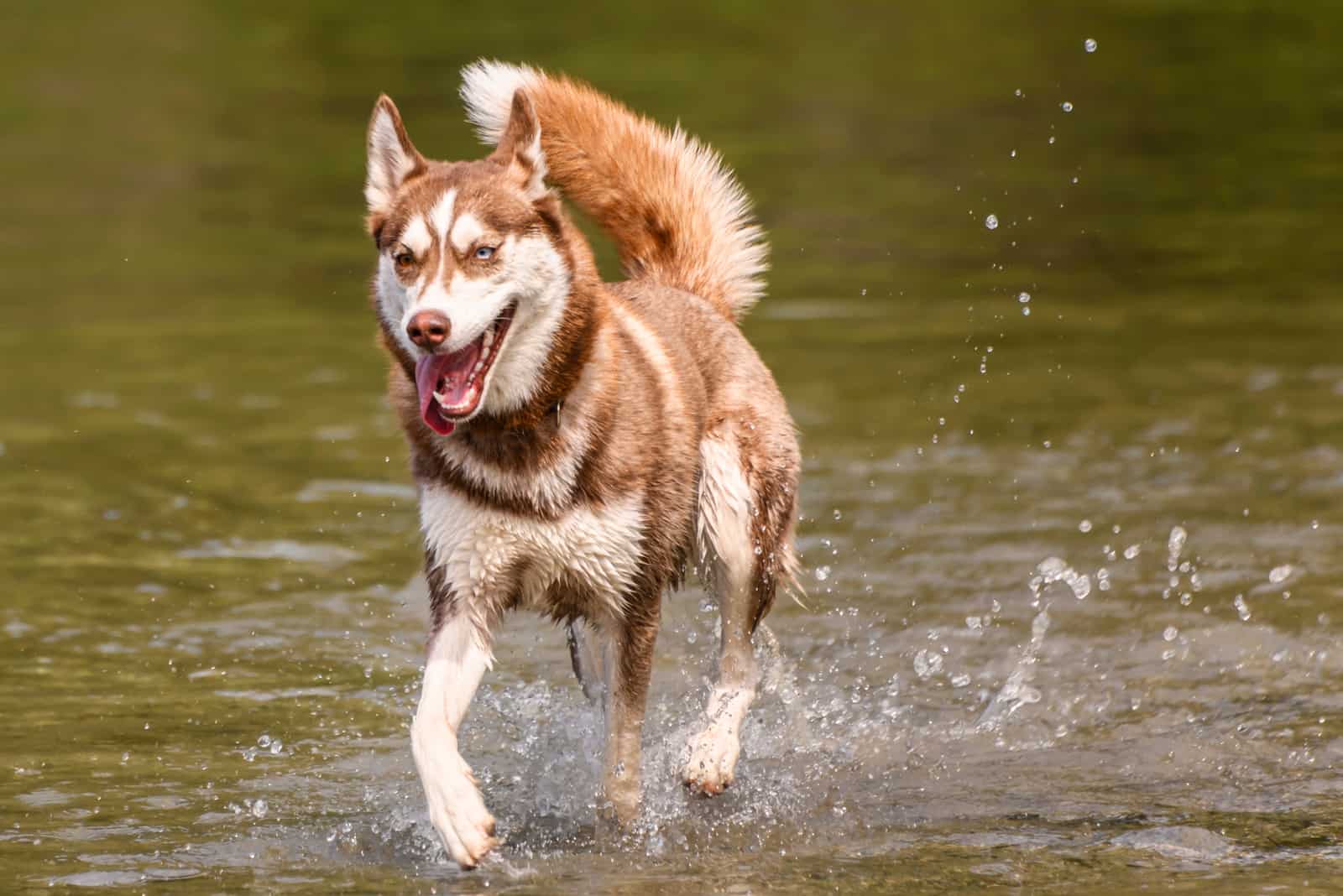
No matter their coat color, Husky dogs require some extensive grooming. From pure white to chocolate brown, you’ll need to dedicate some time to brushing your pooch.
This is because Huskies are high shedders. They shed so much that there are numerous videos out there with people joking about the number of loose hairs that fall off of their pups!
To keep their shedding under control, you need to brush your pups daily. If you cannot do this, then at least brush them once or twice a week. This will help lower the number of hairs that will fly around.
Even so, you will likely still find dog hair on your clothes, furniture, and floors. These are not dogs for people who cannot deal with dog hairs!
Also, Huskies are seasonal shedders. The amount of shedding will increase in spring and fall, and this is when you’ll really have to struggle to keep up with the number of fallen hairs.
As they have fairly dark hair, if you have white furniture, you might have to clean it every day!
Still, even your dark upholstery isn’t safe, as most brown Huskies have white markings, which means they also shed some white hairs! This is a nightmare for people who love to keep their house looking clean!
Other than that, Huskies are clean dogs. They don’t like to get themselves dirty and they can even groom themselves.
While you might need to give them a bath every now and then, don’t go overboard. A few times a year is more than enough.
Too much bathing can lead to skin problems, and this can only make things worse.
Don’t forget to clean your dog’s ears and trim their nails regularly. This is another way to ensure they are healthy and happy.
Brown Husky Health Problems
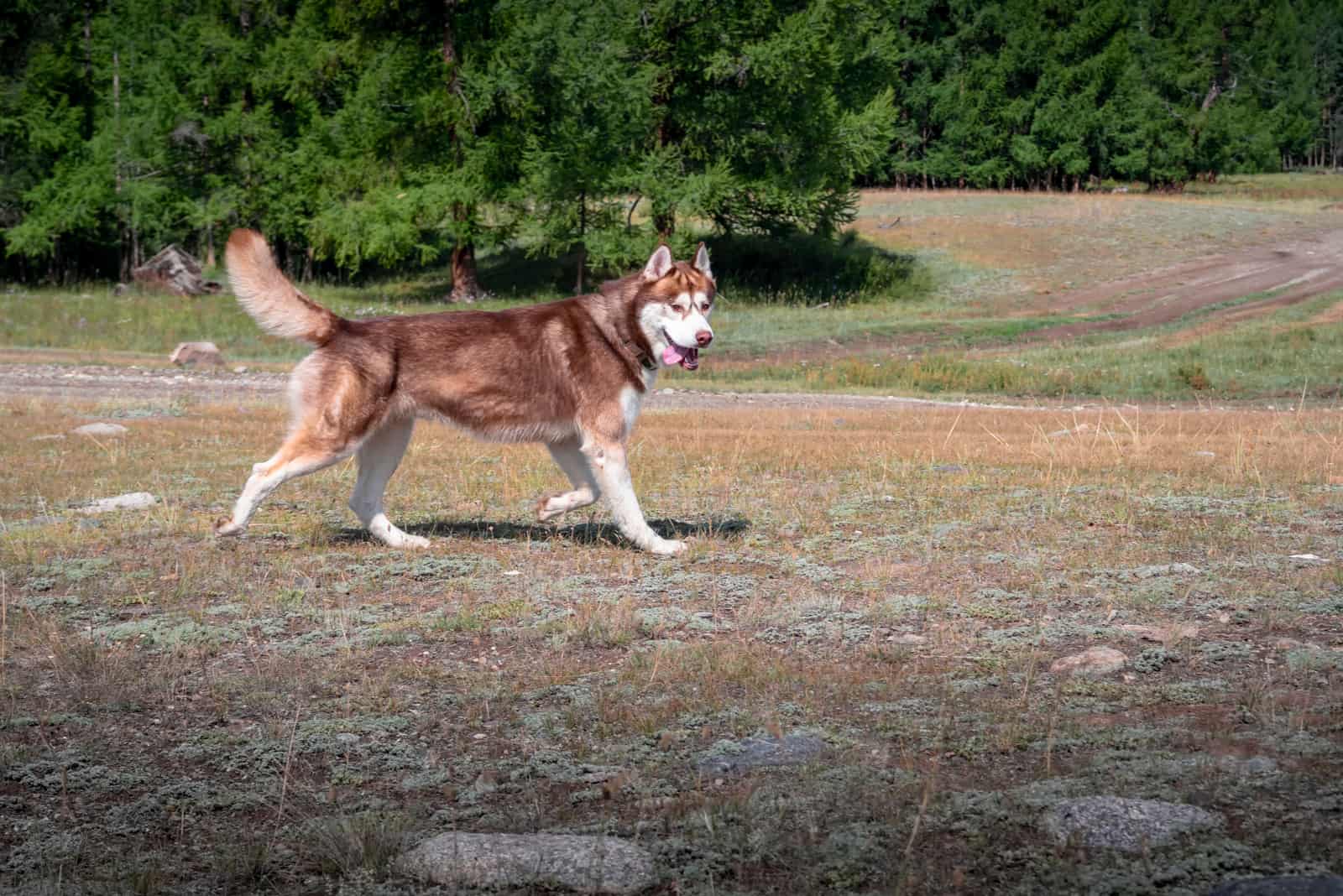
Brown Huskies are healthy dogs with a decent lifespan. However, this doesn’t mean they are free of all health problems.
All dog breeds are at risk of developing some genetic health conditions. In the case of Huskies, these conditions might include:
• Hip dysplasia.
• Cataracts.
• Deafness and blindness.
• Progressive retinal atrophy (PRA).
• Uveodermatologic Syndrome.
A Husky’s blue eyes won’t lead to health problems on their own. However, all bright-colored eyes have less melanin, lowering their defense against harmful UV rays. This means they are more prone to eye defects, such as cataracts, PRA, and corneal dystrophy.
Also, they are somewhat prone to hip dysplasia and similar orthopedic issues, but with a proper amount of exercise and the right type of dog food, the risks can be lowered.
The disease I’d want to focus on is Uveodermatologic Syndrome. This condition is rather rare, except in breeds such as Akita, Samoyed, Alaskan Malamute, and Huskies.
Uveodermatologic Syndrome is a condition that can lead to various problems in dogs, causing issues with their skin, eyes, and nervous system.
Other common consequences are whitening of the hair or even vitiligo!
Mild cases of Uveodermatologic Syndrome will be nothing more than a cosmetic issue, as they will cause white patches in your pup’s beautiful brown coat. However, if the condition worsens, it can lead to blindness and deafness.
Is A Brown Coat Color Unhealthy?
There has been some research trying to find whether brown Huskies are more unhealthy than standard coat colors due to the presence of the dilution gene.
In theory, there is a small risk associated with the dilution gene, but there still hasn’t been enough proof that it can lead to an unhealthy dog. So far, there are no indications that a brown Husky or a red Husky is more unhealthy than a standard black and white one.
The biggest problem with some dilution genes is that it might lead to dogs’ eyes being more sensitive. However, Husky’s piercing blue eyes are a result of an entirely different gene, so even this isn’t the case in Huskies.
As such, so far the only possible conclusion is that there are no health risks associated with the brown coat color in the Siberian Husky breed.
Brown Husky Puppies For Sale
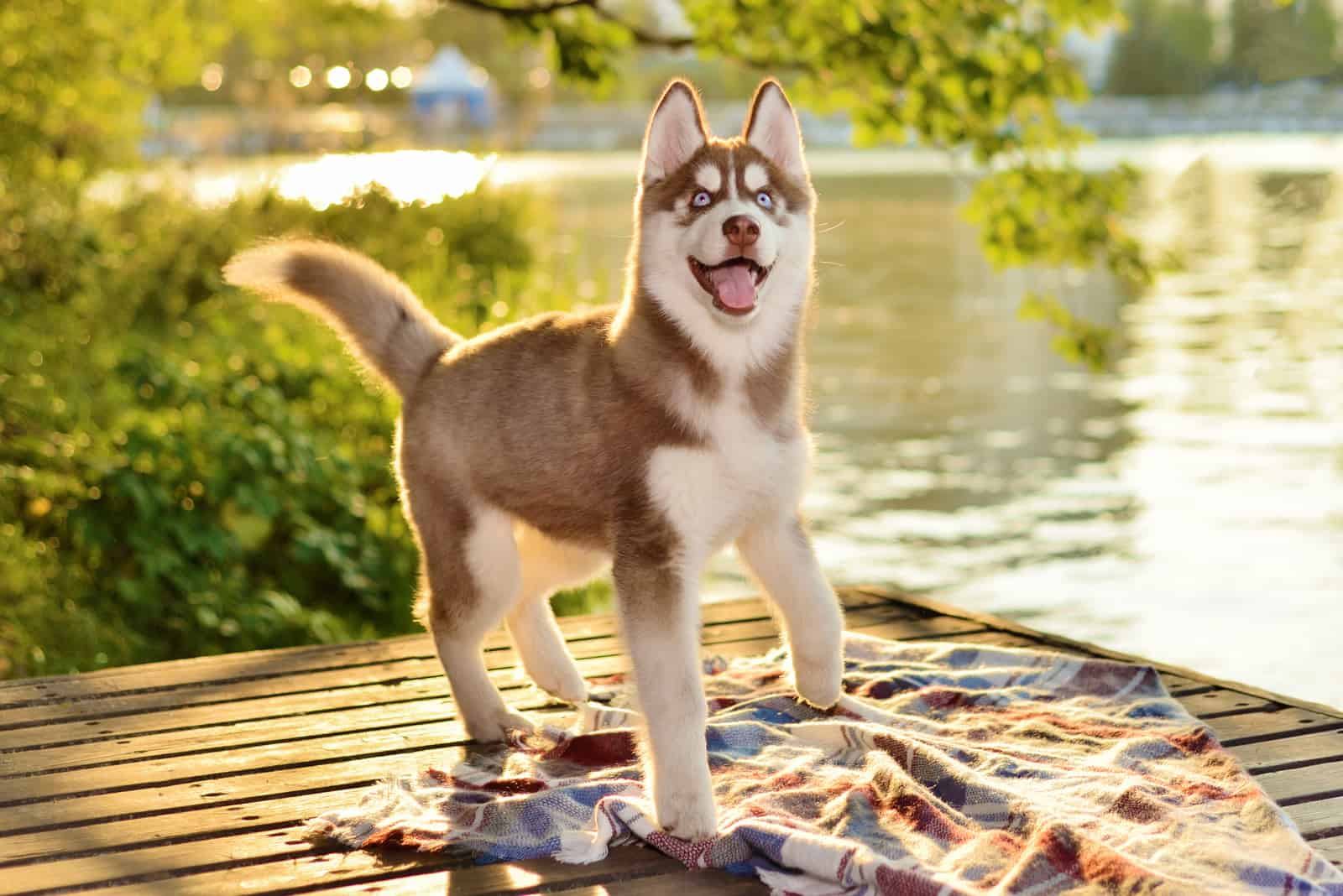
Finding brown Huskies for sale might be more challenging than you think – at least if you’re looking for solid-colored dogs. Dogs with a standard saddle pattern are more common and easier to get.
The gene that causes the brown color in Huskies is recessive. This means that a dog must inherit two copies, one from each parent, for the gene to express itself.
The best way to ensure you’ll get a brown puppy is to mate two brown Huskies. However, brown puppies might be found in a litter of two grey parents, as well!
This might make it sound as if brown Huskies are everywhere. However, as these are rare dogs, it can be a challenge for the breeder to get their hands on a male and a female who is up to the breed standard and to keep producing them.
Also, if you mate a brown Husky with a Husky of any other color, you might lose this adorable copper shade. This is because most other coat colors in Huskies are dominant over brown, and they will take over the offspring.
This is also the reason why many breeders will charge more for their brown Husky puppies. These dogs can be expensive to buy – not to mention the time needed to find a healthy dog suited for the breeding program.
Brown Husky Breeders
While we’re at the breeding, it’s important to note that not all breeders are the same. It’s very important to know who you’re buying your Siberian Husky puppy from, so you can end up with a well-behaved, healthy, and beautiful pup.
The first type of breeder you might run into are commercial breeders, also known as puppy mills.
Puppy mills are locations that profit from selling puppies. For them, breeding dogs is a business and a way for them to gain wealth. Because of this, they’ll try to produce as many puppies as possible in the shortest amount of time.
As you can guess, this isn’t healthy for the parents and the puppies alike. The dogs are being kept in bad conditions, and their only purpose is breeding.
As such, many of these puppies are unhealthy, with lots of behavioral issues.
Puppy mills further sell to pet stores. This is why I would also advise against supporting these locations.
Next, you have backyard breeders. Backyard breeders don’t have the knowledge nor the experience about breeding dogs, but they do it nonetheless. Sometimes, they are the Husky owners that are trying to sell a litter of puppies they didn’t want.
While backyard breeders don’t mean bad, they simply don’t know how to breed dogs properly. This can also lead to many problems.
Finally, you have reputable breeders. Reputable breeders love the dogs they breed, and they have a great insight into this business. They’re so expert that many know exactly how to get a dog with a precise shade of coat. From dark to light brown, they usually know how to predict it all.
Most importantly, reputable breeders conduct various health tests to ensure their dogs are free of most health conditions. This way, you’ll know you’ll be bringing home the best dog possible.
If you aren’t certain which dog breeder is reputable, you can always contact the Siberian Husky Club of America and check with them. You might also ask them to recommend a breeder in your area.
Brown Husky Price
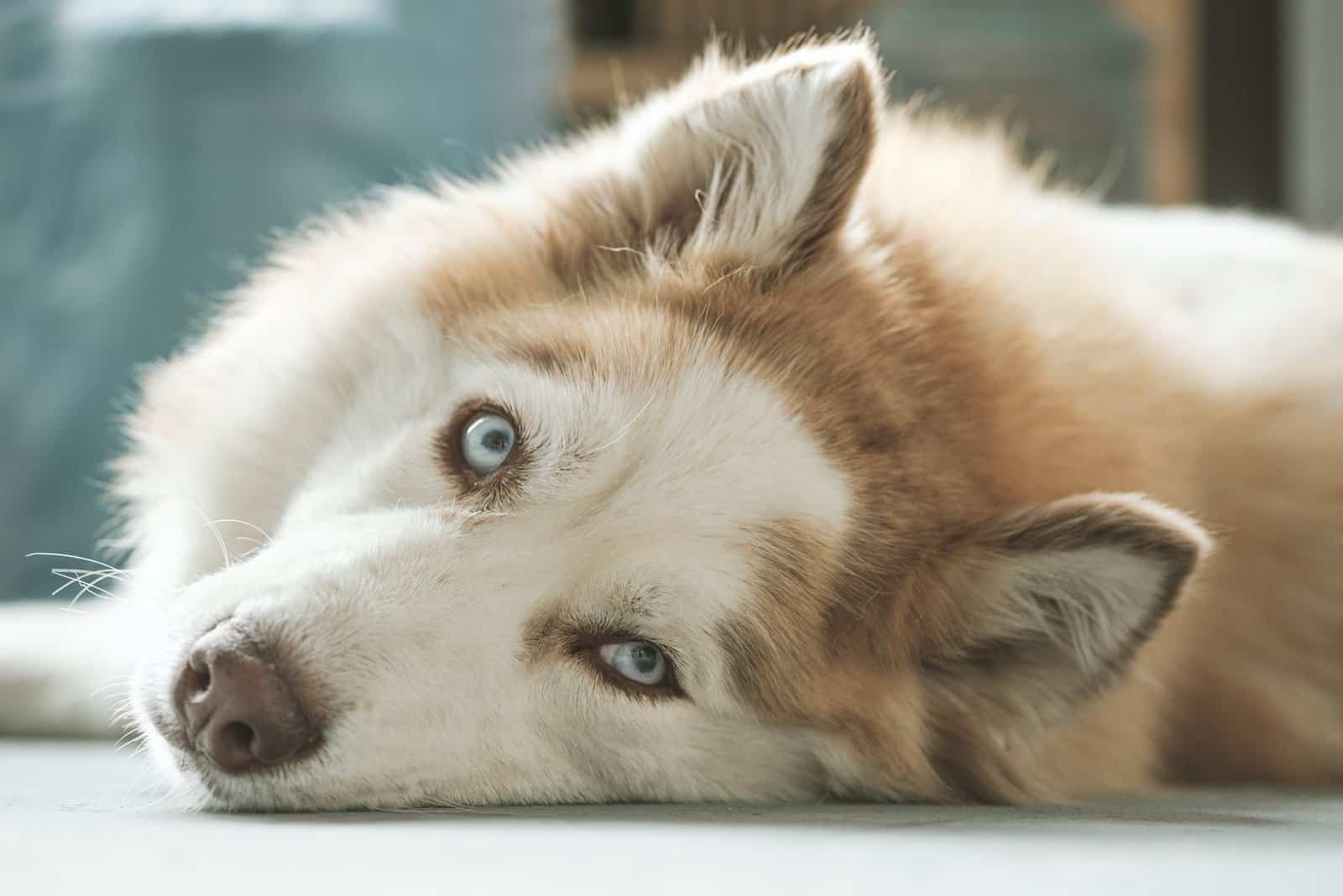
The price of the dog depends on many factors, such as the type of the breeder, your location, the dog’s bloodline and pedigree, and so on.
It also depends on the dog’s coat color. Rare colors will cost much more than dogs that come in standard coats.
In the case of brown Huskies, you can expect to pay more than $1,000 for these adorable-looking dogs. Of course, I’m talking about the price you will get at the reputable breeder.
Puppy mills and backyard breeders will likely sell their dogs at a much lower price – sometimes as low as $150! However, due to the reasons I’ve stated before, I’d never advise you to buy your puppy from such places.
Finally, you can also choose to adopt from a shelter. By doing this, you’ll not just end up paying only an adoption fee, but you’ll also give a new home to a dog who has been abandoned.
The only issue is that brown Huskies might be hard to find in a shelter. Also, you will have no way of knowing the dog’s background. Still, saving a canine’s life is always a good thing to do.
FAQs
Are Brown Huskies Rare?
Brown Huskies with white markings are not too rare, but they are harder to find compared to standard grey or black dogs.
However, solid black Huskies are very rare, which is why they might cost much more than standard dogs.
The main reason why brown Huskies are rare is that brown color is caused by a recessive gene. This gene can be lost the moment you mate your pup with a dog of some other color.
Another reason why your best friend’s coat color is rare is that brown Huskies are not considered desirable at dog shows. This is especially the case with solid-colored dogs.
When a dog isn’t desired, breeders will avoid producing them. All reputable kennels want to breed dogs that are up to the breed standard and that will come with features that have a good chance of winning conformation shows.
Sure, popularity can affect the demand, which will lead the breeder to produce more dogs of a specific color. This is how merle Corgis or blue Husky eye color became so common.
As not many people know that brown Huskies exist, these dogs are yet to become a usual sight at the dog park.
What Are Brown Huskies Called?
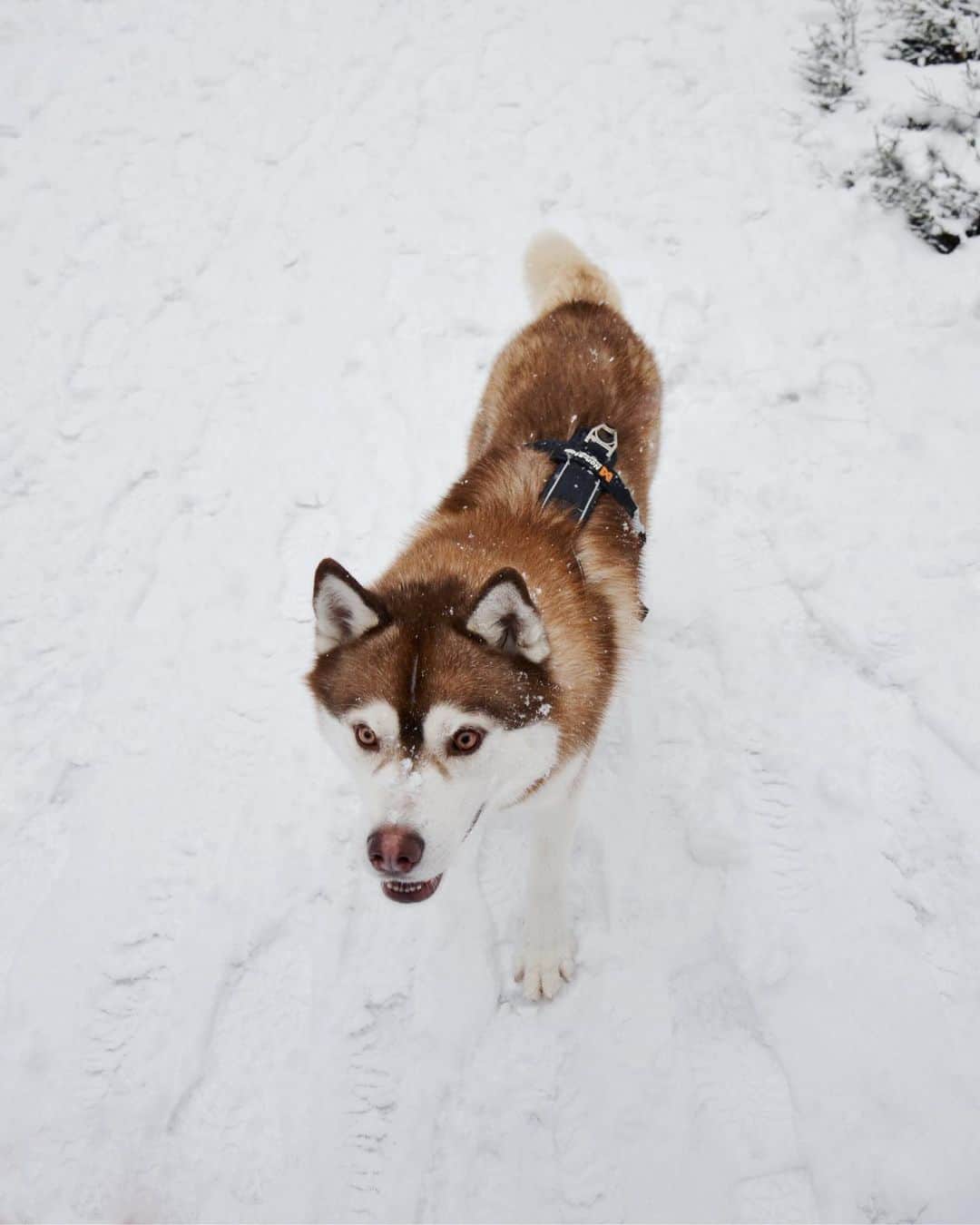
Photo from: @coco_thehusky6
Another reason why you might not have heard about brown Huskies is that they are known by many other names.
While may confuse them with red Huskies, they are not the same and don’t share the same name.
Some of the names you might’ve heard being used for brown Huskies include:
• Sequoi Husky, a label used to determine solid brown dogs with blue eyes and some white markings.
• Husky Quoi (sometimes spelled as Huskyquoi ), just another name used for Sequoi Huskies.
• Sequoi Tenko Huskies, chocolate-brown Huskies with bright blue eyes that are either solid-colored or with a few small white markings.
Most of these names originate from the Sequoia tree, the ancient and giant trees that come in a beautiful bright brown color.
What Is Agouti Husky?
Some people think that agouti Huskies are just another way of naming a brown Husky. However, these are two entirely different dogs.
Agouti Husky is a Husky with a so-called wolf sable, or a wild-type coloring. These dogs have a specific combination of not just sable hairs, but their coat has combined streaks of black and tan hairs.
This means that agouti Huskies have a dark coat color that can be challenging to pinpoint. They are not black and they are not tan, but rather something in between.
Agouti Huskies are very rare – even rarer than brown Huskies!
Keep in mind that agouti Huskies look like smaller wolves. While this gives them a unique appearance, it might also scare some people around you.
I have once seen a frightened dog owner who took their Dachshund out of a dog park the moment they saw an agouti Husky coming to play, screening that there is a wolf in the playground!
Still, they are extremely beautiful, especially if they have a bright blue eye color. Also, they are not wilder than brow Huskies or any other Huskies for that matter. They simply look the part, but they are as friendly as can be!
Are Brown Huskies Hypoallergenic?
No, no Husky dog is hypoallergenic. Huskies are huge shedders, and their hairs fly everywhere. It can be really challenging to control such a large amount of shedding, which is why Huskies and allergy sufferers shouldn’t be combined.
Despite this, they might not pose such a huge problem as some other dog breeds. They are fairly clean, and they don’t drool or love to play around the place where they go to the toilet.
Also, they don’t produce as much dander, which is why you might have fewer issues with their hair compared to the hair of some other dog breeds with similar coat types, such as Corgis.
Still, Husky hair can pose a breathing hazard for sensitive people and kids. If you have dog allergies, I wouldn’t advise you to buy a brown Husky dog.
Read Next:
• 22 Spectacular Dogs That Look Like Huskies
• 715 Best Brown Dog Names For Chocolate Pooches
• 14 Small Brown Dog Breeds As Cute As Nuggets
